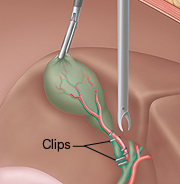Having Cholecystectomy (at our facility)
If you have painful attacks caused by gallstones, your doctor may recommend removing your gallbladder. This surgery is called cholecystectomy. This surgery eliminates pain and prevents future attacks. Best of all, you’ll be able to live a full, healthy life even without your gallbladder. This includes eating the foods you enjoyed before your gallbladder problems started.
Before Your Surgery
-
Stop taking aspirin, ibuprofen, and naproxen as directed. Ask your doctor what to do if you take prescription blood thinners such as Coumadin (warfarin).
-
Have any tests, such as blood tests, that your doctor recommends.
-
Don’t eat or drink anything after midnight, the night before your surgery. This includes water and coffee.
The Day of Surgery
-
Arrive at the hospital or surgery center on time. You’ll be given an IV to provide fluids and medication.
-
An anesthesiologist will talk with you about the medications used to prevent pain during surgery. Cholecystectomy is done using general anesthesia. This lets you sleep during the procedure.
During Surgery
 |
| Clips are used to close off the bile duct and blood vessels so the gallbladder can be removed. |
There are two methods for removing the gallbladder. Your doctor will choose which method is safer for you.
-
Laparoscopic cholecystectomy is used for most gallbladder problems. During surgery, a thin, lighted device called a laparoscope sends images to a video monitor. The magnified view lets your surgeon view and remove the gallbladder using only small incisions in the abdomen.
-
Open cholecystectomy removes the gallbladder through a single, larger incision. It is most often used when scarring or other factors make this a safer procedure for you. There is also a chance that your doctor may need to convert from laparoscopic to open surgery during the operation.
© 2000-2025 The StayWell Company, LLC. All rights reserved. This information is not intended as a substitute for professional medical care. Always follow your healthcare professional's instructions.